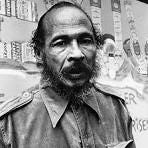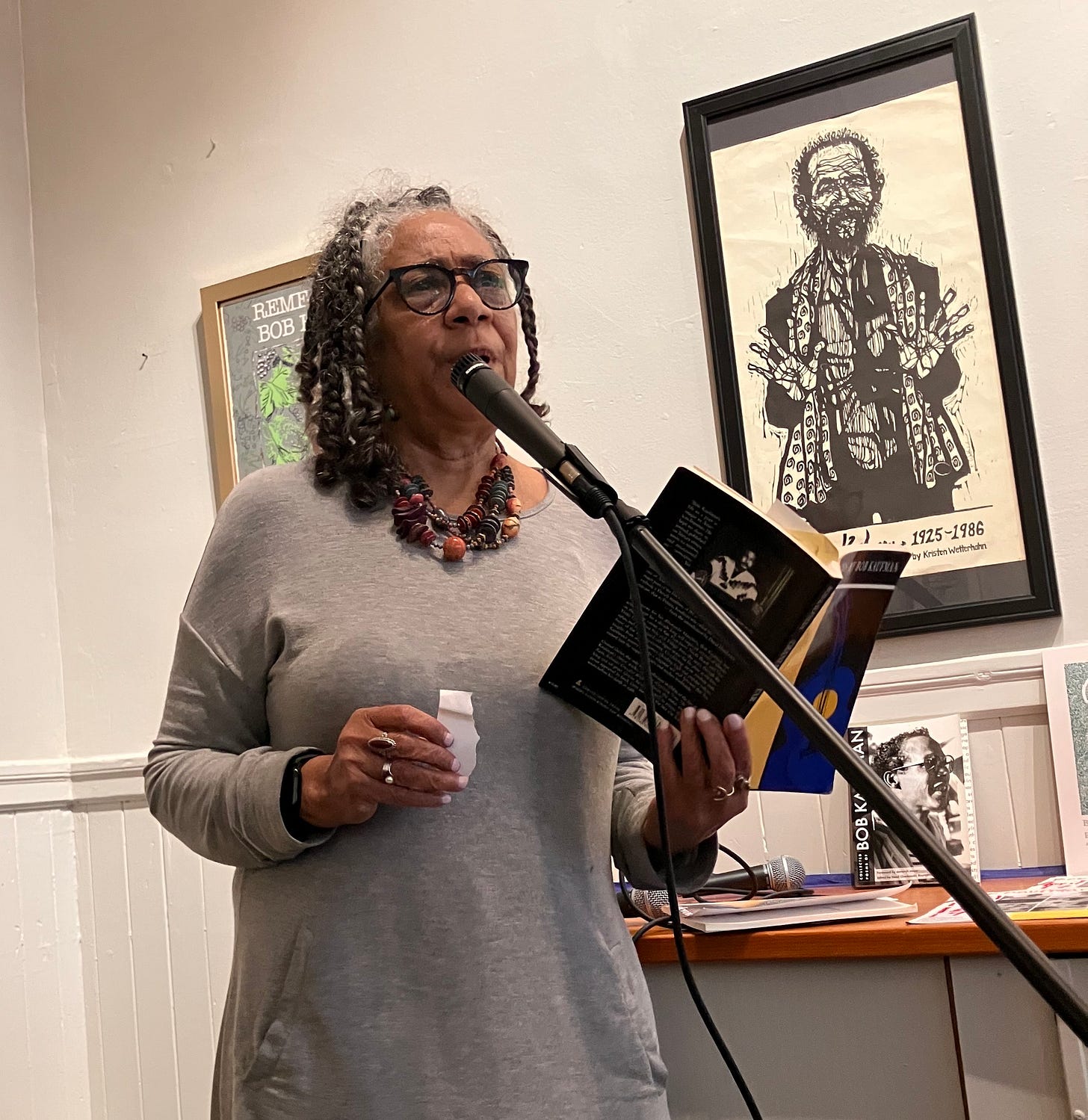Bob Kaufman Centennial, SunnyCo Studio Gallery, San Francisco, April 18th, 2025
By Jonah Raskin
KNOWN IN poetry circles in France and the USA as ‘the Black Rimbaud’ and born one hundred years ago in 1925, Bob Kaufman is surely the least known major Beat poet. In San Francisco, where he lived for many years and where he consistently avoided the spotlight, a group of writers, artists, gallery owners and fans aimed to give Kaufman the recognition he so justly deserves on the 100th anniversary of his birth in New Orleans.
Was Kaufman, who died in 1986 aged 60, behind or ahead of the curve? That seems likely. Had he been alive during the Harlem Renaissance of the 1930s he would have been a superstar. And had he been around for Black Lives Matter he also would have been heralded. He fell through the historical cracks in imperial America.
‘Bob’s chief goal was to be forgotten,’ poet and scholar, Raymond Foye observed at the SunnyCo Studio Gallery on Francisco Street in San Francisco’s North Beach where nearly one hundred Kaufman aficionados gathered to pay homage to the author of The Golden Sardine and The Ancient Rain who was famous for his ‘Abomunist Manifesto’ (1959) in which he wrote in all capital letters ‘ABOMUNISTS DO NOT WRITE FOR MONEY; THEY WRITE THE MONEY ITSELF.’
'Abomunist Manifesto’ was published as a broadside by City Lights. New Directions published The Golden Sardine in 1967 and, in 2019, City Lights brought us his Collected Poems edited by Neeli Cherkovski, Raymond Foye and Tate Swindell.
Pictured above: Raymond Foye at the Kaufman gallery commemoration
Foye, John Geluardi and Swindell entertained the crowd at the gallery with tales of Kaufman, who had a Black father and a Jewish mother. A member of the Communist Party of the USA, Kaufman joined the Merchant Marine, served as a union organizer and helped to found the magazine Beatitude.
He wrote on scraps of paper, table napkins and newsprint and didn’t consciously aim to save his work. Many of his poems burned in a fire in the city’s Dante Hotel where he lived and where he listened to Bob Dylan on record and watched the TV show Barney Miller, a cop show set in Greenwich Village.
Those poems that were saved were singed at the edges. What work of his does survive is due to the efforts of his wife Eileen Singe and his many friends including Raymond Foye and Tate Swindell, who said that in the late 1950s Kaufman was ‘the face of the Beats on the streets of North Beach’ when Ginsberg and Kerouac were not around.
Hounded and arrested by the police, in both San Francisco and New York, Kaufman was jailed and hospitalized. For ten years, beginning in 1963 with the assassination of President John F. Kennedy, he took a vow of silence which lasted a decade.
Pictured above: devorah major reads at the Kaufman gathering
Former San Francisco poet laureate devorah major read her own verse at the event. In a ‘Foreword’ to his Collected Poems, she noted that Kaufman ‘will always be surrounded by myth and mystery’ that he was ‘a poet of the world’, and that his work is best appreciated while listening to the music of Charlie Parker, Thelonious Monk, Billie Holiday, Ray Charles and Béla Bartók.
Earlier in the evening Garrett Caples, Kevin Dublin, Tongo Eisen-Martin and others read from Kaufman’s work at the Golden Sardine, a café and wine bar on Columbia Avenue that honors the poet’s memory.
John Geluardi noted that Kaufman was ‘the soul of the Beat movement’. He added, ‘He had both soul and fury.’ ‘What’s next for Kaufman?,’ someone in the audience asked. No one had a clear answer, though Geluardi pointed out that there is no biography and no volume of letters.
See also: ‘SF celebrates Kaufman centenary’, April 13th, 2025






Thanks for that introduction. I am shocked I didn’t know about him, will be exploring more.
“Kaufman, who had a Black father and a Jewish mother” … isn’t it the reverse?